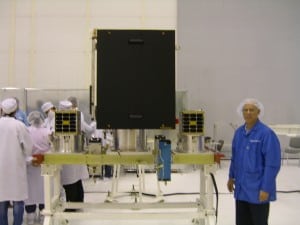Latest News

From left to right: Aprizesat 8, the Korean KARI STSat and AprizeSat 7. Dino Lorenzini is to the right. Photo: SpaceQuest
[Via Satellite 11-26-13] Last week’s Dnepr Cluster Mission launch carried more payloads than any other launch to date. Two of the 32 satellites lifted to orbit were AprizeSat 7 and AprizeSat 8, the products of a satellite manufacturing company called SpaceQuest, which has big ambitions for small payloads. After launching a number of experimental satellites, the company is hoping to stage an entrance in the M2M market using satellites that, though not CubeSats, are small enough for you to carry in your hands.
The purpose of AprizeSat 7 and AprizeSat 8 is to build confidence in the company’s products. “SpaceQuest has been launching a series of micro satellites for the purpose of qualifying the spacecraft components we develop. Once the components are space-qualified, we can market them to government and commercial customers with flight heritage,” said Dino Lorenzini, chairman and CEO, SpaceQuest. With a mass of 14 kilograms per satellite, the company has found a niche in satellite development by leveraging the cost effectiveness of being small, with the benefits of having some scale. “We don’t want to compete with CubeSats, which are quite a bit smaller than our AprizeSats and have less available power. We also don’t want to grow the size of our satellites and compete with larger companies. We’re in a sweet spot right now and it seems to be working well for us.”
SpaceQuest has four satellites that are operating today. Several of the company’s recent satellites have been purchased by exactEarth, a maritime automatic identification system (AIS) service provider located in Canada. Of the two newly launched satellites, AprizeSat 7 has been sold to exactEarth and will be delivered within the next 90 days. AprizeSat 8 still belongs to SpaceQuest. All of the satellites have a lifespan of approximately five years.
“We do sell satellites. We build these experiments and sometimes they work out pretty well, and if there’s a customer for them, we are certainly willing to sell them. The payloads that we build; we also sell those,” Lorenzini added.
Much of SpaceQuest’s current business has come from the sale of satellites and satellite parts. Government agencies such as NASA and the U.S. Air Force, as well as academic institutions, all purchase their satellite components, helping build the company’s repertoire. Bigelow Aerospace, for example, purchased significant amounts of equipment for its Genesis 1 and Genesis 2 space habitats, and Saudi Arabia’s Space Research Institute has also been a frequent customer.
But SpaceQuest is not a service business, so in order to enter the M2M market Lorenzini founded the company AprizeSat Satellite. “Aprize Satellite will be a service company and SpaceQuest will remain as a small satellite development company,” said Lorenzini. “We’d like to provide satellite M2M services through Aprize Satellite, a sister company. That is still a major financial step for us. Aprize Satellite is looking for strategic partners, a company that can provide funding and add value to the program, most likely in the areas of marketing, sales and customer service. “
While Aprize Satellite works to gain traction, SpaceQuest will continue to monetize its ambitions through existing practices. “We have two more [satellites] scheduled for launch in April. These will be AprizeSat 9 and 10; they’ll be experimental again,” Lorenzini said. “We have a number of new components we’d like to test in space, including an advanced UHF transceiver, a repackaged AIS payload, a high performance flight computer and some additional sensors that we aren’t ready to talk about yet.”
“We like the size of our satellites,” he added. “It’s just about right in terms of the volume that we have to put in components and power so it can perform some interesting missions. [And] we like being small [as a company]. We plan to stay at our current size to remain cost effective and be responsive to new space mission opportunities.”
Get the latest Via Satellite news!
Subscribe Now